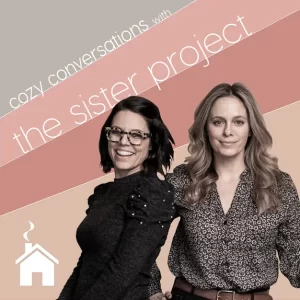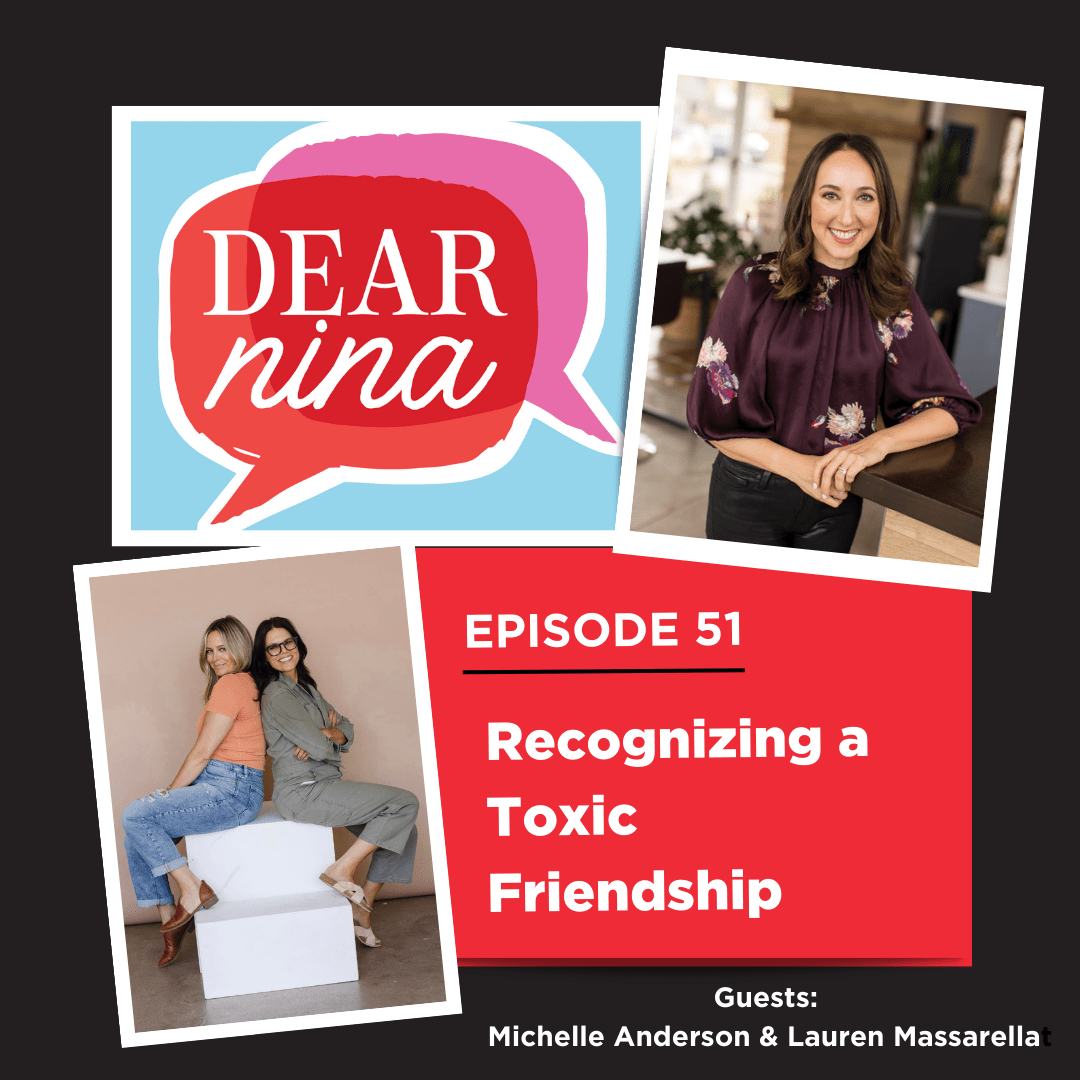Toxic Friendships
First thing to know, not all friendships with issues are “toxic friendships.” I’m not sure there’s a more overused word on the internet. That said, it’s something we need to discuss on a friendship podcast. Recognizing a toxic friendship and what to do about it sounds like a serious thing to discuss. And it is! But my two guests are so fun and delightful that you could almost forget how unhappy these kinds of friendships can make people. Get ready for a lot of Midwestern accents on this episode, starting with mine. Then add Michelle Anderson and Lauren Massarella from the Cozy Conversations with the Sister Project, and you have a spirited, helpful, personal episode of Dear Nina.
About Cozy Conversations with The Sister Project Podcast:

FIND EPISODE #51 ON APPLE PODCASTS, SPOTIFY, OR ANYWHERE YOU LISTEN TO PODCASTS!
Signup for my newsletter on friendship, books, TV, and more.
Detailed Highlights from our conversation:
— We shared some quick notes on being raised in the northern Chicago suburbs (Nina) and the Westerns ones (Michelle and Lauren).
— I taught Lauren and Michelle about Jewish geography since they’re not Jewish.
The Term “Toxic Friendship”
Nina: “I struggle to use the word toxic because internet culture can make words meaningless. I hate to say this because it sounds insensitive, but not everything is trauma. Not every person who left you out one time is a toxic friend. This expectation that friendships will have no problems is pretty unreasonable. Friendships have ups and downs. That’s even in the description of my podcast. I describe it as conversations about the ups and downs of friendship because if it was all ups, I would have nothing to podcast about. . . When I say toxic, it’s almost all downs for too long. And we’ll use the word toxic because people use it. But let’s think about what it means. It means poisonous. I end every episode saying when our friendships are going well, we’re happier all around. And the opposite is true. If our friendships are not going well, it brings us down.”
Lauren: “I would say a toxic friendship is when it gets to that point where your mental health, your emotional health is affected by the friendship and you are feeling all consumed.”
— Lauren shared a specific example from her life of a friend showing up when she very specifically asked for space during a hard time. And to make things worse, that friend showed with a ton of false positivity and intrusiveness. Lauren also shared later in the episode how she directly told the friend that their friendship was over. We discussed how some people need to hear that very directly.
Michelle: “When I think of a toxic friendship, I think of that phrase ‘energy vampire.’ When you’re in a situation where they suck the life out of you. I think I’ve had two friendships that I would describe as toxic, and when I think back to how those relationships felt when they started to get bad, I felt really emotionally drained. I felt like I was being dragged into a space that wasn’t mine. And because I am more of a helper and a fixer and an ear, and I am such a loyal friend, sometimes I find myself getting pulled into these things, and then I realize that it’s a one-way street to nowhere and the only thing I’m getting out of it is ‘the sads’ and feeling anxious and overwhelmed and all of the low-vibing feelings that one should not be feeling when they are in a good fulfilling friendship.”
— We agreed that friends should be able to ask for help. And it’s also nice, especially when the situation isn’t urgent, to give your friend an out. To let them off the hook if it’s a really bad time for them.
Some Toxic Friend Traits
— In a piece about toxic friendships on today.com that quoted a therapist named, Karina Ibar Jacobs. One thing she talked about was boundaries, and she also used the word guilt a lot, specifically someone who makes you feel guilty when you say no, and someone who makes you feel guilty for spending time with other friends. As well as somebody who pushes you to abandon your own limits, your own values. For example, someone who pushes you to drink more than you would want to be drinking.
— We shared some different examples from our lives, some that we were able to reconcile later, and some that needed to stay friendships from the past.
— Some other traits we shared: friends who push for information we clearly do not want to discuss, on the opposite end, friends who never ask anything and only do the talking.
A reminder that we do get to choose your friends, and keep choosing
Nina: “Sometimes we allow ourselves to be trapped in a friendship because that was the person who got us through a certain situation, and at the time, they probably were good friend. But things change, and it’s hard to remember that we get to choose. It isn’t forever.”
Michelle: Life is hard enough. Friends are supposed to be a support. Lauren and I always say friend time is a necessity. Some of my most enriching, fulfilling, battery-recharging moments are when I’m surrounded by my friendships that are a give and take. When somebody needs something, we’re there. When I need someone, they’re there. When none of that is part of the equation, I’m out.
We talked about whether our friends listen to our podcasts and whether that bothers us or not (and how not to bring it up all the time). Lauren and Michelle had good advice for me on that.
I brought up a related and helpful question I answered years ago for authors called, “Will Friends Read My Book?”
Let’s connect!
- Here’s my Substack newsletter about friendship & more
- JOIN the Dear Nina Facebook group
- Ask an anonymous question
If you like what you’re hearing, please tell a friend!
Also, if you can rate and/or leave a review on Apple Podcasts, I’d be so grateful.
Latest posts by Nina Badzin (see all)
- Dear Nina in The Wall Street Journal - April 27, 2024
- 5 Friendship Issues to Consider Addressing with a Therapist - April 17, 2024
- Subtle Friendship Slights and Changing Your Instagram Handle - April 10, 2024
- The Courage to Trust Friends After You’ve Been Hurt - April 2, 2024


